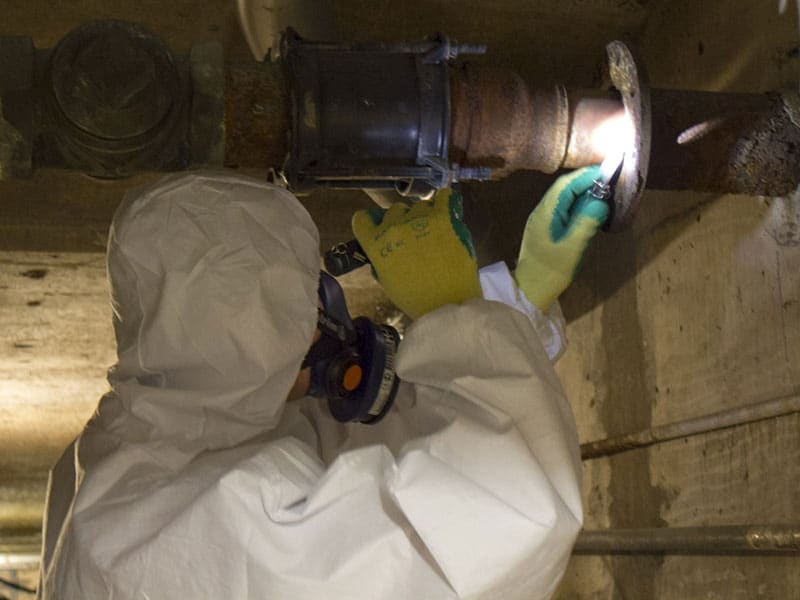Who is responsible for an asbestos survey?
The fact that you are reading this will hopefully indicate that you are already broadly aware of the dangers that asbestos poses and the important role that asbestos surveys play in ensuring the safety of building occupants and users.
Asbestos was, after all, once a very widely used building material in the UK. However, as time went on, awareness increased of the very real risks to the health of people who inhaled or ingested the substance.
Conditions like mesothelioma and asbestosis are strongly associated with asbestos exposure, and to this day, more than 5,000 people a year die in the UK as a result of asbestos-related disease.
It should be unsurprising, then, that the use of asbestos in the UK was eventually banned in 1999. However, the material is still present in many UK buildings constructed before 2000, which underlines the importance of safe and responsible asbestos management.
Asbestos surveys play a major role in such asbestos management, which is crucial for helping to ensure people do not come into contact with the substance.
Let us, then, take a closer look at the continued need for asbestos surveys, the legal situation around asbestos surveys, and the subject of who is responsible for such surveys.

What is an asbestos survey, and why is one needed?
An asbestos survey is a type of survey that is carried out in a building, property, or structure. The purpose of an asbestos survey is to perform a ‘materials assessment’, so that the person undertaking the survey can find out:
- Whether asbestos-containing materials (ACMs) are present – and if they are, what the ACM is, and the location and quantity of the material
- How accessible the asbestos-containing materials are, their condition, and any surface treatment
- What type of asbestos is present – the surveyor may do this by sampling or presuming.
The term “asbestos-containing materials”, or ACMs, refers to materials that are known to contain asbestos, or that are presumed to contain asbestos.
From a practical and moral standpoint, anyone who is aware of the dangers asbestos can pose will know why an asbestos survey is necessary. An asbestos survey will help make clear exactly where asbestos is in the given building or structure. That way, the person responsible for the premises – and the safety of the people using those premises – can take steps to minimise or remove the risk.
However, it is also often a legal necessity to arrange to carry out an asbestos survey, even if this won’t be the case for every single building – as we will explain in more detail.
Who is responsible for an asbestos survey being carried out?
In order to answer this question from a legal standpoint, it is important to familiarise ourselves with what is known as the “duty to manage”. This is contained in regulation 4 of the Control of Asbestos Regulations 2012 (or CAR 2012).
The duty to manage asbestos applies to those who manage non-domestic premises, given that these are the people who are responsible for protecting the safety of those who work in or otherwise use such premises. If you are a dutyholder, you will be responsible for taking the steps necessary to help keep users of your buildings safe, which might include arranging for an asbestos survey.
The “dutyholder” under CAR 2012 – in other words, the person effectively responsible for having an asbestos survey carried out – is the owner of the given non-domestic premises, or the person or organisation with clear responsibility for the maintenance or repair of those premises.
The dutyholder may be given such responsibility through a formal arrangement, such as a tenancy agreement or contract.
Is an asbestos survey mandatory?
Companies like Oracle Solutions are often asked whether an asbestos survey is a truly mandatory requirement in all non-domestic properties. It isn’t a question that we can answer in a single line, as it depends hugely on the specific circumstances of the property.
One of the things that a dutyholder must do to comply with regulations, is find out whether their premises contain asbestos – and if so, the location and condition of that asbestos. If there is any uncertainty as to whether any given materials contain asbestos, it must be presumed that they do (unless there is strong evidence that they don’t).
In practice, it can often be extremely difficult to ascertain whether or not there is asbestos in a given property, without arranging for someone to carry out an asbestos survey on the premises.
Technically, there isn’t any legal requirement to specifically have an asbestos survey carried out. But given what we have said above, there are certain circumstances where an asbestos survey is likely to be essentially mandatory. So, it is crucial to be aware of how government regulations apply to the specific property for which you are responsible.
Types of asbestos survey
There are several broad types of asbestos survey that the dutyholder, building owner, employer and/or surveyor should be aware of, given that they are quite different to each other and apply to different circumstances:
Asbestos management survey
A management survey is the type of asbestos survey that someone can carry out during the given building’s normal occupation and use. The dutyholder might even be able to undertake a management survey themselves, if the premises are straightforward and simple. For more complex properties, however, it will be necessary to call upon a professional surveyor’s expertise.
This type of survey typically involves the professional surveyor investigating the property and taking samples of any potential asbestos-containing materials. Those samples are then sent to a lab for testing.
The focus with an asbestos management survey is on locating any ACMs that normal activities in a building could disturb or damage. It is therefore a type of survey that involves only minor intrusion into the building, and minor asbestos disturbance.
Asbestos refurbishment/demolition survey
As the name suggests, this type of asbestos survey is needed if upgrading, refurbishment, or demolition of the premises – or part of the premises – is set to take place.
Although it isn’t necessary to record the condition of the ACMs with this type of survey, a professional surveyor is normally required in order to carry out a refurbishment or demolition survey.
The aim with this type of survey is to locate and identify all ACMs in the given building, before any structural work begins at the premises. It is therefore a more extensive and intrusive type of survey, to help minimise the risk of anyone being exposed to asbestos once the work has been carried out.
Reinspection survey
A building that has previously been subject to an asbestos management survey can be reinspected to check whether the previously detected ACMs on the site have changed due to factors such as ‘wear and tear’ or accidental damage.
This is an important check to make, because if the condition of the asbestos-containing materials is indeed found to have changed, this might affect the level of risk the asbestos presents to the health of those using the buildings. This, in turn, may necessitate different decisions on how to manage the asbestos.
When a surveyor carries out an asbestos reinspection survey, they typically refer to the initial asbestos management survey. They will use this information to methodically examine the site and reinspect each and every asbestos item that the original asbestos survey identified. They will then issue a new report, consisting of a new condition assessment and recommendations.
What is a dutyholder required to do?
The aforementioned regulation 4 of CAR 2012 requires the person who “has the duty” – in other words, the dutyholder – to undertake the following tasks:
- Take reasonable steps to determine whether there are asbestos-containing materials in the non-domestic premises for which they are responsible – and if so, the location, amount, and condition of those ACMs
- Presume materials contain asbestos, unless there is strong evidence that they do not
- Make, and keep up-to-date, a record of the location and condition of the ACMs, or materials presumed to contain asbestos
- Assess the risk of anyone being exposed to asbestos due to the presence of the identified materials
- Put together a plan that outlines in detail how the risks from the on-site asbestos-containing materials will be managed
- Take the steps required in order to put that plan into action
- Periodically review and monitor the plan, as well as the arrangements to act on it, so that the plan can be kept relevant and up to date
- Provide details on the asbestos-containing materials location and condition to anyone who is liable to work on or disturb them.
As you can see, asbestos surveying isn’t explicitly mentioned in the above list. However, if you are the dutyholder for any given premises, you are likely to need to arrange for an asbestos survey to be carried out, in order to accomplish the above tasks.
What else do you need to know in relation to asbestos surveys?
As the list above makes clear, there is a wide range of responsibilities that dutyholders have, so the “duty to manage” does not concern only asbestos surveying. Nonetheless, the right asbestos survey will provide a strong foundation to enable you to comply with your regulatory duties.
One other vital step when you are arranging for an asbestos survey to be carried out, will be ensuring you choose the right surveyor. You should only ever appoint a surveyor who has the knowledge, experience and credentials needed for the specific type of asbestos survey you wish to have performed at your site.
With that in mind, you might have reason to contact Oracle Solutions about our own asbestos surveying services. Not only do we cover the whole of the UK, but we also offer the complete range of currently available asbestos surveys, and are quality assured and accredited.
So, you might not feel the need to consider any other asbestos surveying specialists before enquiring to us. Call us today, or send us an email, and we will be pleased to send you a fast, free, and competitive quote.

Written by Mark Carter
Mark Carter is a renowned expert in asbestos management, offering clients vital guidance on compliance and safety. His expertise is invaluable for navigating asbestos regulations, ensuring both safety and legal adherence. Mark's role is central in providing effective asbestos-related solutions, helping clients achieve their business objectives with an emphasis on regulatory compliance and safety in asbestos management.
